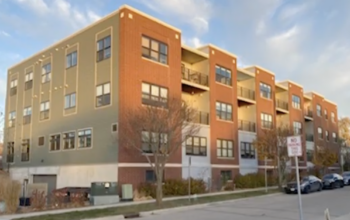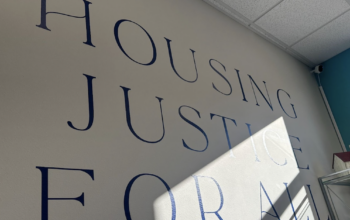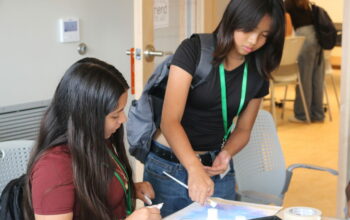MADISON, Wis – With its numerous educational institutions creating a workforce with diverse talents, Wisconsin has attracted the attention of tech-giants like Microsoft as a place to set up operations in an increasingly artificial-intelligence driven world, opening more opportunities for startups.
So said Microsoft’s chief technology officer, Irina Petrakova-Otto, during an Oct. 24 luncheon at the Sheraton Madison Hotel hosted by the Wisconsin Technology Council. The tech-heavy panel included Milo Martin, engineering director at Google’s Madison site, and Otto herself. Both spoke on Wisconsin’s potential – and by extension, Madison’s – as a hub for technological innovation and research, especially concerning artificial intelligence.
“We are looking for the convergence of a lot of different areas of education,” explained Otto, regarding Microsoft’s approach to working on and researching AI. “Wisconsin is right for this as UW institutions have adapted to this need really well.”
Microsoft is currently developing a billion-dollar data center in Mt. Pleasant.
Google, however, established their Madison engineering site in 2007, gravitating toward the expertise and talent that UW––Madison’s computer science department offered more than 15 years ago.
“A lot of the chips that Google has for machine-learning–that work came out of Madison,” said Martin.
Since it began planting roots in Madison, Google has steadily increased the number of their engineers based in the city to between 100 and 200.
“There is a very unique combination of skills and backgrounds in Wisconsin that you don’t find in many places,” said Otto. The Microsoft CTO further elaborated on how, just as New York has its finance hub and California its centers for technological innovation, the diversity in expertise within Wisconsin make it suitable for establishing a new professional base in the state for tech development.
The gravitation to and continuation of bigger tech-firms in Wisconsin only serves to increase the scope of the existing local startup-ecosystem, according to Tad Milbourn, founder of RankedVote, a Madison-based startup that runs a ranked-choice voting web app.
“You need anchor tenants. Having big tech like Google and Microsoft in the area means that employees there get to observe these companies operating at the absolute pinnacle of tech,” said Milbourn. “They learn how these companies handle scale. They learn how these companies operate. They learn so many things that you just can't get in a textbook.”
Milbourn also expanded on how the presence of tech-giants such as Google and Microsoft in Wisconsin will, in addition to providing grounds for experiential learning, help to build a pool of talent for entrepreneurs in the state to draw from.
Madison particularly saw a jump in its tech-sector’s growth a year into the pandemic, according to a Brookings Institution report. Tech employment numbers rose an additional 2.6% in 2020 alone, compared to an increase of 3.6% between 2015 and 2019.
“If you look at them as wonderful training grounds, and you're an entrepreneur in the Madison area who's ambitious and aggressive and looking to do more, well, hey, that could be a great place to look for talent,” Milbourn said. “People who are maybe feeling a little bit stifled in a larger company and are looking for something where they have a big impact on a small group, as opposed to a small impact on a big group.”
Milbourn himself moved back to Madison during the pandemic, after multiple entrepreneurial ventures in the San Francisco Bay Area, and recognizes the tech-entrepreneurial spirit he saw there growing as a culture in Wisconsin’s capital as well.
“One of the dynamics that I saw in Silicon Valley was this creative cycle and spreading of ideas and innovation as people moved from one company to the other," reflected Milbourn, “I feel like there’s a lot more of that daring, creative entrepreneurial ethos here. Grads coming out of the university are feeling a bit more of ‘yes, I can start my own company.’ Entrepreneurship is a valid option, not just a pipe dream.”
The conversation around Wisconsin’s rising tech-scape has also intensified in light of the state’s recent designation by the Biden-Harris administration as a regional tech-hub for biohealth. The designation involves supporting increased investment toward developing the state as a center of innovation, which is good news for startups looking to start new tech businesses in Wisconsin..
“Madison is perhaps further along in its biohealth or life-science related tech-ecosystem, but it is also making advances in other areas of technology, such as ag-tech, clean-tech, and energy-tech,” said Abram Becker, interim director at Discovery to Product (D2P), an organization on UW Madison’s campus that guides and supports innovators on their journeys.
“A couple of recent fusion startups in Madison have now raised money and are moving forward,” Becker said.
“Realta Fusion and Type One Energy Group, both based in the Madison area, were two of eight ventures from across the nation that the U.S. Department of Energy selected for grants worth millions of dollars to support research and development of fusion energy technologies,” stated an article by UW–Madison’s College of Engineering in June 2023.
Martin, when putting his view of Madison’s tech-ecosystem into words, described it as “vibrant, and with more potential.”
“There’s already the green shoots of it all. It’s now just about building other pillars outside of biotech while still continuing to double down on that strength,” said Milbourn.




